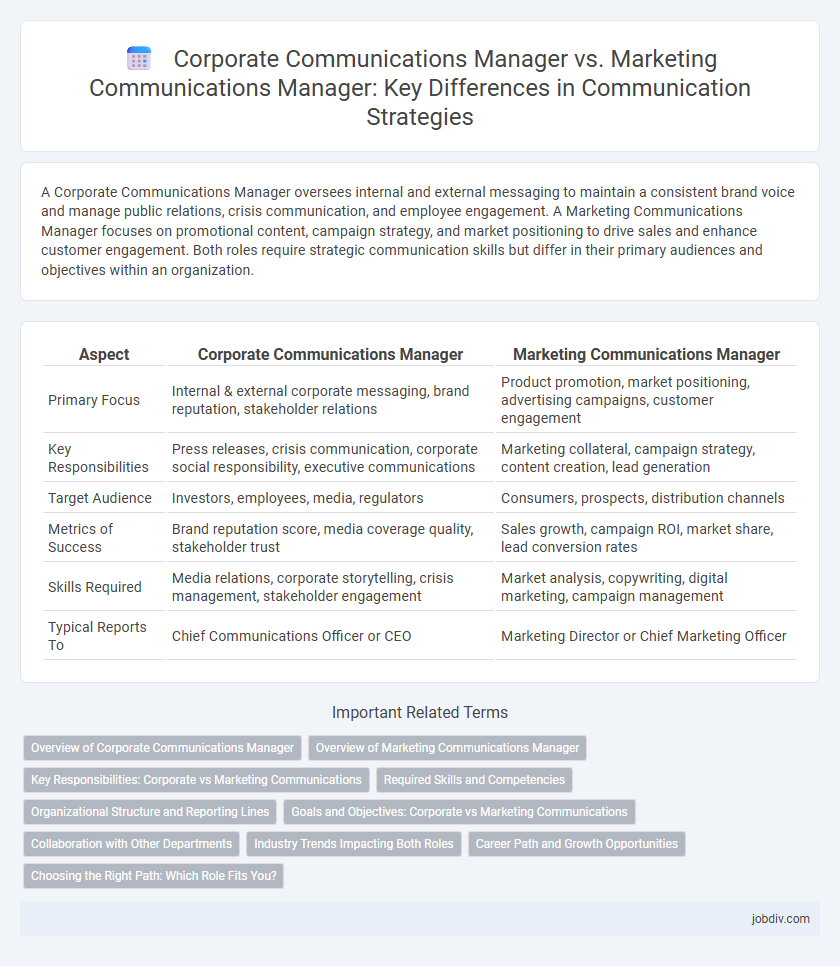A Corporate Communications Manager oversees internal and external messaging to maintain a consistent brand voice and manage public relations, crisis communication, and employee engagement. A Marketing Communications Manager focuses on promotional content, campaign strategy, and market positioning to drive sales and enhance customer engagement. Both roles require strategic communication skills but differ in their primary audiences and objectives within an organization.
Table of Comparison
| Aspect | Corporate Communications Manager | Marketing Communications Manager |
|---|---|---|
| Primary Focus | Internal & external corporate messaging, brand reputation, stakeholder relations | Product promotion, market positioning, advertising campaigns, customer engagement |
| Key Responsibilities | Press releases, crisis communication, corporate social responsibility, executive communications | Marketing collateral, campaign strategy, content creation, lead generation |
| Target Audience | Investors, employees, media, regulators | Consumers, prospects, distribution channels |
| Metrics of Success | Brand reputation score, media coverage quality, stakeholder trust | Sales growth, campaign ROI, market share, lead conversion rates |
| Skills Required | Media relations, corporate storytelling, crisis management, stakeholder engagement | Market analysis, copywriting, digital marketing, campaign management |
| Typical Reports To | Chief Communications Officer or CEO | Marketing Director or Chief Marketing Officer |
Overview of Corporate Communications Manager
A Corporate Communications Manager oversees internal and external communication strategies to enhance a company's reputation and ensure consistent messaging across all platforms. This role involves managing media relations, crisis communication, and executive communications while aligning messaging with corporate values and goals. Expertise in public relations, stakeholder engagement, and brand management is essential for driving a cohesive communication strategy.
Overview of Marketing Communications Manager
Marketing Communications Managers develop and execute strategic campaigns to promote a company's products or services, ensuring consistent brand messaging across various channels. They specialize in content creation, market research, and audience targeting to enhance customer engagement and drive sales growth. Collaboration with sales, product, and creative teams is essential to optimize communication effectiveness and align marketing objectives with overall business goals.
Key Responsibilities: Corporate vs Marketing Communications
A Corporate Communications Manager primarily oversees internal and external communication strategies to enhance company reputation, manage crisis communication, and align messaging with corporate values. In contrast, a Marketing Communications Manager focuses on promotional campaigns, brand messaging, product launches, and coordinating advertising efforts to drive customer engagement and sales. Both roles require expertise in strategic messaging, but corporate communications centers on stakeholder relations while marketing communications targets market growth and consumer influence.
Required Skills and Competencies
Corporate Communications Managers require strong skills in media relations, crisis management, and internal communication, emphasizing strategic messaging and reputation management. Marketing Communications Managers focus on competencies in brand storytelling, digital marketing, content creation, and campaign analytics to drive customer engagement and sales growth. Both roles demand excellent interpersonal communication, project management, and data-driven decision-making abilities to align messaging with business objectives.
Organizational Structure and Reporting Lines
A Corporate Communications Manager typically reports to the Chief Communications Officer or the Vice President of Corporate Affairs within the organizational structure, overseeing internal and external communications, corporate branding, and stakeholder relations. In contrast, a Marketing Communications Manager usually reports to the Marketing Director or Chief Marketing Officer, focusing on campaign messaging, product promotion, and market segmentation strategies. Both roles require close collaboration, but their reporting lines reflect distinct responsibilities aligned with corporate reputation management versus targeted market engagement.
Goals and Objectives: Corporate vs Marketing Communications
Corporate Communications Managers primarily focus on maintaining the company's overall reputation, managing internal communications, and ensuring consistent messaging across all stakeholder groups to support brand integrity. Marketing Communications Managers drive promotional campaigns to boost product awareness, generate leads, and increase sales through targeted messaging tailored to specific customer segments. While corporate communications aim to foster trust and corporate identity, marketing communications prioritize customer engagement and market growth.
Collaboration with Other Departments
Corporate Communications Managers collaborate closely with HR, Legal, and Executive teams to ensure consistent messaging and uphold corporate reputation across internal and external channels. Marketing Communications Managers work primarily with Sales, Product Development, and Creative departments to align promotional content with brand strategy and market trends. Both roles require cross-departmental coordination to deliver cohesive communication strategies that support overall business objectives.
Industry Trends Impacting Both Roles
Corporate Communications Managers and Marketing Communications Managers both navigate the increasing demand for integrated digital platforms, leveraging data analytics to tailor messaging and enhance stakeholder engagement. Industry trends show a rising emphasis on corporate social responsibility and brand authenticity, pushing these roles to align communication strategies with ethical practices and transparency. The convergence of content marketing and crisis communication further blurs the boundaries, requiring expertise in real-time response and multi-channel storytelling to effectively manage brand reputation.
Career Path and Growth Opportunities
Corporate Communications Managers focus on managing internal and external messaging to enhance brand reputation and stakeholder relationships, often advancing into roles like Director of Communications or Chief Communications Officer. Marketing Communications Managers specialize in promoting products and driving sales through targeted campaigns, leading to career growth as Marketing Directors or Brand Managers. Both paths offer growth opportunities in strategic leadership, but Corporate Communications emphasizes reputation management while Marketing Communications centers on market positioning and customer engagement.
Choosing the Right Path: Which Role Fits You?
Corporate Communications Managers specialize in shaping a company's public image through media relations, internal communications, and crisis management, making them ideal for those who excel in strategic messaging and stakeholder engagement. Marketing Communications Managers focus on promoting products or services by developing targeted campaigns, advertising, and brand messaging to drive sales and customer engagement. Choosing the right path depends on whether you prefer managing a company's reputation and internal narrative or creating marketing strategies that directly influence consumer behavior.
Corporate Communications Manager vs Marketing Communications Manager Infographic

 jobdiv.com
jobdiv.com